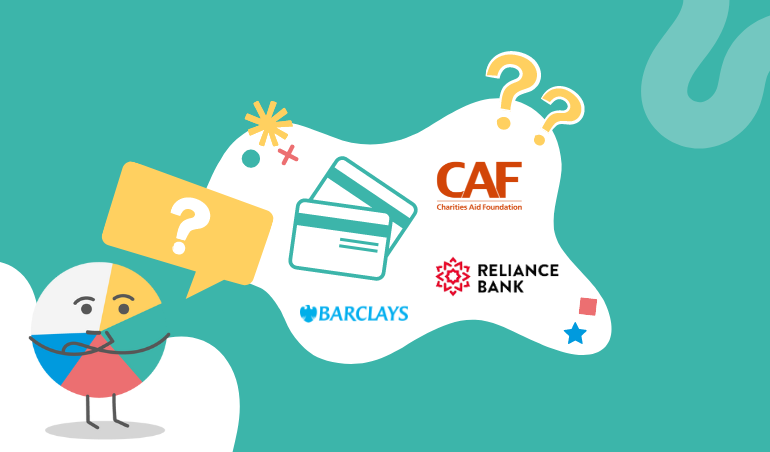Pete Marfleet is a verified ExpensePlus consultant and bookkeeper. In this blog, Pete explores the best bank cards for churches and charities.
How does your charity cover expenses on a week-to-week basis? Does your team have access to a bank card or a credit card or do they pay for things out-of-pocket and then seek reimbursement?
While the latter approach may work well for small and less frequent expenses, what happens when your spending increases? At my church, the staff covered all the expenses using their personal credit cards. However, expenditure grew to a level where the church’s trustees rightly questioned whether it was fair to expect staff and volunteers to personally fund church expenses in advance. Sometimes, they put thousands of pounds on their credit cards before claiming it back! We explored alternative ways to manage staff expenses, and this blog will guide you through that process.
What are the options?
These are the three main bank card types that will provide your team with a means of paying for your charity expenses:
Debit Cards – We are all familiar with personal debit cards. Business debit cards work in the same way. They are usually straightforward to apply for and easy to use, but offer less financial control compared to other options. For these reasons, trustees can be reluctant to authorise them, especially for larger teams. Some banks issue debit cards which won’t allow you to spend more than is in the bank account. This gives a greater level of control.
Business Credit Cards – This is a great option if your staff are spending money overseas, especially because business credit cards offer theft protection for your money. The downside is that they will charge interest if not paid off in full. Additionally, not everyone may be eligible for one, and banks may require personal credit checks on your staff as part of the application process.
Pre-paid Cards – Many different providers offer prepaid cards. You can top up these cards with money from your main bank account. You can set spending limits per card and issue cards to your staff as needed. It’s normally an easy process, with no credit checks required. These cards provide the best financial control however, they often charge higher fees. You can use virtual cards within the ApplePay or GooglePay apps. This allows your team to start spending within minutes of receiving a card.
Considerations when choosing a bank card
Here are five important considerations that will help you select the right type of bank card for your charity:
(1) What are the card fees? – Unlike personal bank cards, business versions usually come with a fee. This can include a standing monthly charge, a per-use charge, an interest charge, or an issuing fee per card. Some of these fees can be substantial, so you need to fully understand the costs involved. Digging into the terms and conditions of the card provider will help you avoid any surprises.
(2) How easy is opening an account and adding cards? – If your team is small and doesn’t change much, this may not be much of an issue for you. However, if you have a large or changing team, or you need temporary cards, then you’ll want an option that is quick and easy to apply for. Additionally, you’ll want the ability to add or remove cards without a complicated application processes.
(3) Can you set spending limits per card? – From your trustees’ perspective, it is crucial to have the ability to set a spending limit on the cards. Additionally, consider how easily you can set card limits. What’s the process for this and how easy is it to adjust them if necessary?
(4) Can you easily download transactions? – If you use ExpensePlus accounting software, ensure that the card provider offers a .csv statement that you can download easily for your card transactions. Additionally, make sure they provide the necessary data to allow you to reconcile the account balance within ExpensePlus. Choosing a card provider with a straightforward process will make life much more efficient for your bookkeeper.
(5) Is the card provider ethical? – Most charities want to keep charity funding in banks with high ethical values and standards. As charities, we have a responsibility to use banks that are ethical and sustainable. This blog post explores the Best Ethical Bank Accounts for Churches & Charities. When choosing a card provider, you may want to consider the ethical credentials of the bank or card provider.
Some Bank Card Options
Below are several options for each type of bank card we have considered for charities:
Reliance Bank Debit Card
Reliance bank offer business debit (Visa) cards with their charity current accounts.
- Pros: There’s no issuing fee. The application process is a simple paper form per card user. Transactions are recorded in the normal bank account statement, making it easy to import into ExpensePlus. You can set spending limits lower than the £1000 default amount on request and different cards can have different limits.
- Cons: their pricing shows they charge 25p per domestic transaction, £1.25 per foreign currency transaction. There’s a Point of Sale (POS) limit of £1000 on the cards. There’s an ATM cash withdrawal limit of £100 per card in a 24hr period.
- Best for: Charities looking for highly ethical banking solution with debit card included. Better suited to charities with low volume of card expenditure due to the per transaction fees.
CAF Bank Business Card
CAF Bank’s Mastercard Business Card links to your CAF current account.
- Pros: CAF provides this card for free if you have a current account with them. There’s no setup or per transaction fee. Transactions are recorded in the normal bank account statement, making it easy to import into ExpensePlus.
- Cons:
- Spending limits apply to the account, not the cards. Mastercard sets the daily limits initially, and you must apply for any changes to that. Daily limits available are £250, £500, £1000, £2000, £3000, £5000 but are not guaranteed to be approved by the card provider. Limits Example: For an account with a daily limit set at £500 and 4 cards on the account, if two staff members spent £100 each on their cards on a particular day, the remaining staff members could only spend a maximum of £300 between them on that same day.
- If you need multiple cards, the card user’s name doesn’t always show up on the bank statement for some Point of Sale transactions. This makes it difficult in ExpensePlus if card holders haven’t entered the transaction and you need to notify them.
- You cannot use the cards to get a bank balance at ATMs, you need to check that online.
- Best for: Charities that are already using CAF bank current accounts, do not have large teams or significant variations in card usage, and do not require per user limits to manage their spending.
Soldo
Soldo provides prepaid Cards with lots of financial control.
- Pros:
- A flexible solution that works well with ExpensePlus. Cards can be issued for free within minutes as virtual cards, with physical cards available at £5+VAT per card. Each card can have its own prepaid ‘wallet’ where funds are held. Or, you can have them all linked to a central ‘wallet’, which you top up from your main bank account as needed. You can set limits for individual cards, with other financial controls available to restrict the types of transactions cardholders can make. With the admin account, you can easily keep track of individual card balances with alerts available if a cardholder needs a top-up. Individual users can request more money via their own Soldo app and the account admin will be notified.
- Cards can be issued for just one month, allowing temporary cards for volunteers where it is needed for a specific event or project.
- Soldo also offers subscription cards that are not issued to individual users. These cards are specifically used for your organisation’s online subscriptions. This means that you do not need to update them if staff members leave and their cards are cancelled.
- The admin account allows for an easy .csv download to import to ExpensePlus for any data range you want. It’s best to have Soldo as a bank account in ExpensePlus, with money transferred to it and the cards then feed off those funds via a central ‘wallet’.
- There’s a 1 month free trial to give things a go. There’s also no long term contract – you can cancel cards at any time and you only pay for the months you used them.
- Cons: It’s expensive with a number of different fees to be aware of. As well as the physical card issuing fees, there are monthly fees, including a £6+VAT per card per month fee. The minimum monthly fee of £18+VAT includes 3 users. Look at the pricing here to get the full details.
- Best for: Larger charities that require a minimum of 3 cards and are willing to pay higher fees to have the ability to set spending limits at the individual card level, rather than the same limit for all card holders. It is also ideal for organisations that have a high volume of transactions, subscriptions, or need to issue temporary cards to volunteers for short periods.
Equals
Equals is another prepaid option that offers both virtual and physical cards.
- Pros:
- There is an easy and flexible .csv download to import data into ExpensePlus.
- You can transfer money onto each card. This limits the amount that each cardholder can spend.
- Cons: There are monthly fees and the physical cards cost £10+VAT to create (compared to Soldo’s £5+VAT). It’s also worth reading the fees section of their terms and conditions because there are several fees associate with the cards, including an out-of-currency fee, ATM transaction fees, refund and significant ‘dormant card’ fees. Equals cards can’t be used for payments with some suppliers such as Travelodge and Premier Inn. Therefore, you should consider the planned uses of the card.
- Best for: Charities that want a prepaid card provider with flexible options for both physical and virtual cards.
Barclaycard and other credit cards
Barclaycard is a well-known brand and some charities use the Barclaycard Select Credit Card. These other credit card providers have more ethical credit card options. Some of the pros and cons below will apply to other credit cards too.
- Pros: Barclaycard is a well-known credit card that you can use worldwide. There is no application or annual fee for using this card. It offers up to 56 days of interest-free credit and includes purchase protection and cardholder misuse insurance. You can also specify the types of transactions for the card on the application form, adding additional security.
- Cons:
- Application: A longer application process than the debit or prepaid card options above. Your card holders may have to have personal credit checks done as part of the application.
- Like any credit card, the interest rates will sting if you don’t pay off the card in full each month.
- Integration with ExpensePlus generally works fine. However, to download the .csv transaction file you will need to wait until about a week into the following month. There is no option for on-demand downloads if you want to import transactions for a custom date range that falls in the middle of the month. If you like to keep on top of your matching on a weekly basis, or have a very large transaction set on the account, this is a real pain.
- Barclaycard is a trading name of Barclays Bank PLC which has one of the worst ethical ratings of the major bank brands.
- Best for: Credit cards are ideal for charities with a limited number of cardholders, particularly when used by senior members who don’t require such tight financial control of a prepaid card. These cards can also be beneficial if the user frequently travels abroad for charity work and needs flexibility. A travel-specific credit card may offer better international exchange rates and be less likely to reach debit card limits or exhaust a preloaded payment card. Depending on the card issuer, your purchases might also be automatically insured, covering not just consumer goods but also travel delays and lost luggage.
Card purchases in ExpensePlus
Whichever bank cards you choose to use, ExpensePlus can handle business card purchases easily for both the cardholder and the finance team:
Cardholders – in ExpensePlus you can simply and quickly enter business card purchases and upload a photo of your receipt on the go (or upload or email the receipt later).
Finance team – bookkeepers and treasurers can add cards to bank accounts or add separate card accounts, depending on the card. You can upload transactions from statements weekly or monthly, and easily match transactions to purchases which cardholders have uploaded.
Got more questions?
If you have questions about how your ExpensePlus setup can help you manage your charity’s finances, get in touch via support@expenseplus.co.uk.
Please note that this article is not intended to be taken as financial advice and is only correct at the time of writing. Charities and churches should evaluate themselves which bank cards best align with their organisational needs, recognising that there may be trade-offs between factors such as fees, usability and ethical credentials.
Pete Marfleet is a verified ExpensePlus consultant and bookkeeper. He offers a range of cost-effective services, from outsourced bookkeeping and ExpensePlus training, to project managing the migration of your current accounting systems to ExpensePlus.







